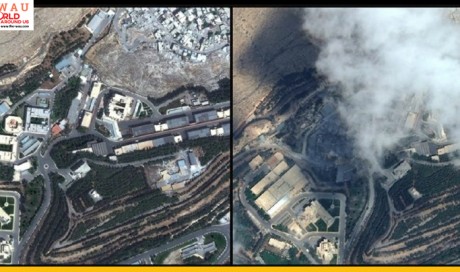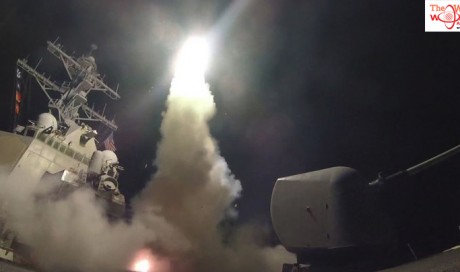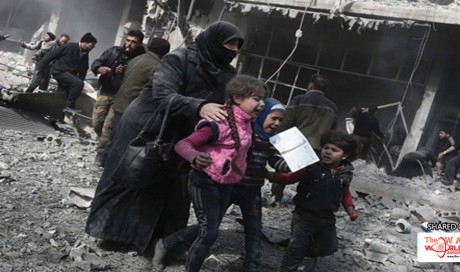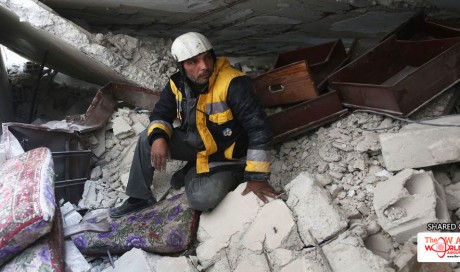A new deal on the so-called de-escalation zones in Syria , which came into effect on Saturday in an effort to reduce violence in the war-torn country, has been received with mixed reactions by residents of the affected areas.
While some were optimistic that it would benefit civilians, others expressed doubt over its sustainability.
"Some parts of this deal could be good for us," Ammar, a resident of Eastern Ghouta, told Al Jazeera.
"It has been a long time for us trying to create safe zones, something the whole world has failed to do. If this is actually serious, so much will change for us here. We need help."
The deal , which was signed by Russia , Turkey and Iran in Astana, calls for a cessation of hostilities between rebel groups and forces fighting on behalf of the Syrian government in four de-escalation zones located mainly in opposition-held areas of the country.
The four zones cover areas in the provinces of Damascus, Idlib, Latakia, Aleppo, Homs, Hama, Deraa and Quneitra.
The areas include Eastern Ghouta, western areas of Aleppo province, northern areas of Hama province, Rastan and Talbiseh in northern Homs province, and parts of Deraa and Quneitra provinces.
The memorandum specifies that a six-month renewable truce begins on May 6 and that the government's air force will halt all flights over the de-escalation areas. Russia said that fighting against the Islamic State of Iraq and the Levant ( ISIL , also known as ISIS) and al-Nusra Front will continue inside and around these zones.
It also stressed that hostilities will be controlled between the parties, including the use of any types of weapons. Unhindered, immediate and safe humanitarian access will be provided under the supervision of the Syrian government, the document said.
Required conditions will be created for providing medical aid to the population, and measures will be taken to restore infrastructure, water supplies and other life-supporting systems.
The Syrian government has said that although it would abide by the agreement, it would continue fighting "terrorism" wherever it exists.
Mohammed Anas, another resident in Ghouta, told Al Jazeera that naming this deal a "de-escalation zone" agreement is "a distortion of its actual goals and could be an act to cover up for future violations committed by the government".
watch Video:
"This agreement could help facilitate better living conditions for us from a humanitarian perspective ... It could also help our economy," Anas said. "Despite that, there is no way things will go back to at least 50 percent of how they used to be. The international community has allowed the main source of brutality in Syria, Russia and Iran, to be representatives in this deal, and that should not have happened."
Another resident in Ghouta, who spoke on condition of anonymity, told Al Jazeera that she does not believe in the agreement.
"How is this normal? Ghouta is part of the agreement, but Qaboun, which is only minutes away, is not? And it is being heavily bombarded every day," she said. "Since our government declared war on us, the whole world sat and watched. These safe zones are just buying the government more time to continue to do what it has been doing for years now. Someone needs to end this war."
A similar view was echoed by Ismail Aladani, the head of Idlib's local committee, who said that people only want the war to end.
"People are exhausted from war. People want the fighting to stop, the air strikes to stop. But people do not trust any deal involving Russia," Aladani told Al Jazeera.
"People are now waiting to see if anything will actually happen on the ground. Idlib has witnessed in the past few days a very evident calm phase, because war planes were absent from its skies."
Other residents voiced concerns about how the deal would be implemented.
"I also do not think applying the terms included in this agreement would be easy, because we all know Astana talks did not include the US, and without the US there would be a gap," said Khalil, a resident from Aleppo.
"The US backs some Kurdish factions and has a huge influence on what could happen in and around Aleppo province. The clash of interests here could have a negative effect on creating safe zones in this area. I believe things are going to the worst, despite this deal."
But according to Khalil and other residents, although people are "optimistic" about the deal and hopeful that Turkey will send forces to secure these zones, they are nonetheless fearful about what al-Nusra Front could do in retaliation. "People want Turkey to be involved like they were involved in Jarablus and Azzaz," he said.
Other residents said that the Russians must be committed to the deal.
"People are confused and do not know what to expect. People here believe different things; people are torn apart on whether to believe something this huge can happen or not," Atela, a resident in the Latakia suburbs, told Al Jazeera.
As the Syrian conflict enters its seventh year, more than 465,000 people have been killed in the fighting, more than one million injured and more than 12 million - half of the country's pre-war population - displaced from their homes.
Meanwhile, Ammar in East Ghouta noted that many previous deals that came out of Geneva and the United Nations had failed Syrians: "Until now, the Syrian people believe all of those are or have been empty promises."
Share This Post















